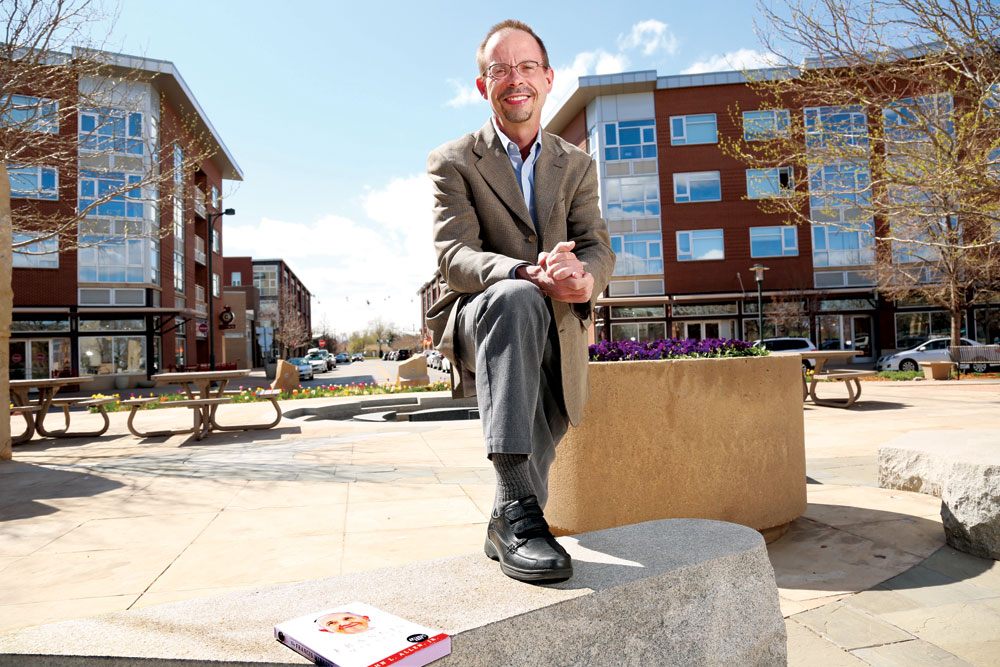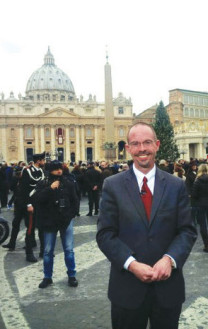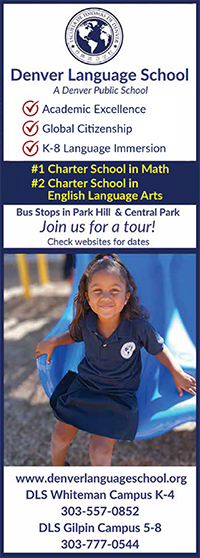
John L. Allen Jr. spends one-third of the year traveling, one-third in the Vatican City, and one-third at home in Stapleton. He’s shown here at the 29th Avenue Town Center with his newest book, The Francis Miracle.
Who knew the top Vatican expert lives right here in Stapleton? John L. Allen Jr. is the associate editor at The Boston Globe specializing in the Vatican and Catholic Church. He is also the senior Vatican analyst for CNN.
He worked at the National Catholic Reporter for 16 years and was offered a job at The Boston Globe to head “The Crux,” a section dedicated to all things Catholic. He now spends about one-third of his year traveling, one-third at home in Stapleton, and one-third in Rome. He has written nine books about the Vatican, including his most recent, The Francis Miracle.
Here are highlights from an interview with John L. Allen Jr. about his Vaticanista life and the current state of the Catholic Church.
You wrote about Pope Francis even before he became pope. How did you know before he was chosen that he was an important player to watch?
He was the Cardinal of Buenos Aires in Argentina. Argentina is one of the largest countries in the Catholic world … I mean anybody who was paying attention to the church affairs, hardly just me, I think would have known Bergoglio is somebody you have to take seriously. That said, let’s be 100 percent clear that I did not predict he was going to be elected pope, even though if you Google my name, it calls me the man who predicted the pope.
What is the pope like in person?

John L. Allen Jr. stands outside the Vatican. Photo provided by Shannon Levitt.
I think he’s very much one of those people, what you see is what you get. There is nothing fake about the image he projects. He’s in the business of humility and simplicity and being an ordinary guy. He’s very much who he is.
I remember the first time I met Bergoglio, it was before he was elected pope. It was in 2001… I walk in and there’s a guy dressed in simple priest clothes, no finery, sitting there in a folding chair [usually meeting an archbishop requires a long wait and is a upscale meeting]. I am kind of startled and he looks up and asks if I am Allen. And I say “Yes, I am here to see His Excellency Archbishop Bergoglio” and he says “I’m Bergoglio.” I am like totally stunned and then he says, “Should we just get another chair?” And I’m like You really don’t understand how this works, do you? So they put us into this room and he says, “Can I get you a coffee or something?” and again I thought, You just don’t get it. You don’t have to do that for yourself. You can tell these guys in white jackets what you want and it will show up on a silver platter. And so I knew from that encounter that the stuff you were seeing from the new pope after the new election, this business of not wanting to live in the papal apartment, not wanting to be driven around in a Mercedes, not wanting to be walled off from people, that wasn’t an act. That’s genuinely who he is.
And plus, what he does that previous popes didn’t is he works his own phone and he is forever making these cold calls to people he has never talked to before who have written him letters for one thing or another, like a grandparent in Russia who wants him to pray for her son. She’ll put her phone number in there and out of the blue a few days later he’ll call her up. I mean it happens all the time.
Do you think the bureaucracy ever wishes he would stick to tradition?
On the one hand, it kind of drives the bureaucracy crazy because you never know what he’s going to do next because you all know bureaucrats above all crave predictability … On the other hand … having a wildly popular pope makes their lives easier. When they go on TV they’re no longer getting tough questions about child sex abuse scandals or crackdown on nuns, even though those stories haven’t gone away. The questions they’re getting today are like, rock star pope takes world by storm. When they walk through an airport, when they get in a cab, when they go into a restaurant, when they visit a parish they’re not finding outrage anymore, they’re finding euphoria.
Pope Francis has focused on financial cleanup of the church, reaching out to nonbelievers, bigger roles for women … he is breaking tradition in so many ways.
The one thing that is absolutely clear about the impact he’s had so far is that what you would probably call the moderate constituency in the church—that is not liberals who want to change church teaching and not conservatives who want to ram it down people’s throats—but that moderate clump in the center, which I do believe is the majority, that would basically uphold the official teaching in how it’s applied, that moderate constituency is feeling emboldened by this pope.
How does the pope manage opinions from the various constituencies that make up the Catholic Church?
Every pope has that challenge. So sure, Francis has to think about how the Curia is reacting to stuff. He has to think about how bishops around the world are reacting to stuff. He has to think about how the Catholic grassroots are reacting, and by the way, how the grassroots react is wildly different in various parts of the world. The typical Catholic in sub-Saharan Africa is going to have a very different cluster of attitudes than the average white Catholic in the U.S. Bear in mind there are 1.2 billion Catholics in the world, two-thirds of whom live outside of the U.S., so it’s a radically global community. The pope has to think about all of that and also has to think about broader public opinion.
What would the U.S. be like if Francis was president?
Well, for one thing, I think the current incumbent would swap his poll numbers in a heartbeat. Listen, I think frankly it would be a little bit odd because Francis has never been to the U.S. He’ll freely admit his English isn’t very good and he doesn’t know much about the U.S. I think on our end, particularly Americans and Catholics tend to think that everybody around the world gets out of bed every morning thinking about us. So if something is a big deal for us, then it’s gotta be a big deal for the rest of the world—whereas the reality of the Catholic Church today is that just under 70 million Catholics in the U.S. represent only 6 percent of the global Catholic population. Put another way, 94 percent of the Catholics are not Americans, okay? So this is the first pope from a developing world, the first pope from Latin America. Of course he gets that the U.S. is important, but it’s just not his top priority.
I think the raw truth is that he probably could not get nominated by either party because I think his positions on social justice issues, the environment, the economy, war and peace, and race would rule him out for the Republicans and positions on life issues such as abortion, contraception and gay marriage would rule him out for the Democrats.
The Roman Catholic Church is another language in a way. How do you make it interesting and relatable to all readers?
That’s the big trick. I would say 60 percent of my work isn’t reporting, it’s translation because the raw truth of the matter is Rome is from Mars and America is from Venus. We are talking very different cultural worlds and it’s not just language. It’s culture—good news in that work. I can tell you based on 20 years of experience doing this job two things are true: 1) Catholic or not, Americans are intensely interested because it comes off to them as this fascinating cocktail of mystery and intrigue and plotting and history and romance. 2) Most of them don’t know anything about it, so whatever you have to tell them is fresh, new and exciting, so it’s really a great gig.




0 Comments